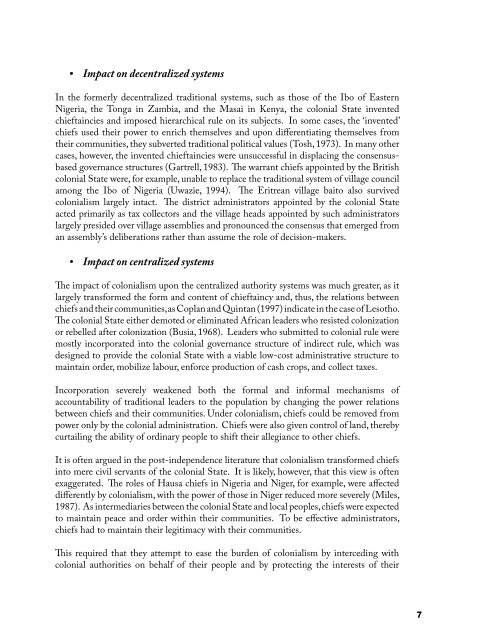Relevance of - United Nations Economic Commission for Africa
Relevance of - United Nations Economic Commission for Africa
Relevance of - United Nations Economic Commission for Africa
You also want an ePaper? Increase the reach of your titles
YUMPU automatically turns print PDFs into web optimized ePapers that Google loves.
• Impact on decentralized systems<br />
In the <strong>for</strong>merly decentralized traditional systems, such as those <strong>of</strong> the Ibo <strong>of</strong> Eastern<br />
Nigeria, the Tonga in Zambia, and the Masai in Kenya, the colonial State invented<br />
chieftaincies and imposed hierarchical rule on its subjects. In some cases, the ‘invented’<br />
chiefs used their power to enrich themselves and upon differentiating themselves from<br />
their communities, they subverted traditional political values (Tosh, 1973). In many other<br />
cases, however, the invented chieftaincies were unsuccessful in displacing the consensusbased<br />
governance structures (Gartrell, 1983). The warrant chiefs appointed by the British<br />
colonial State were, <strong>for</strong> example, unable to replace the traditional system <strong>of</strong> village council<br />
among the Ibo <strong>of</strong> Nigeria (Uwazie, 1994). The Eritrean village baito also survived<br />
colonialism largely intact. The district administrators appointed by the colonial State<br />
acted primarily as tax collectors and the village heads appointed by such administrators<br />
largely presided over village assemblies and pronounced the consensus that emerged from<br />
an assembly’s deliberations rather than assume the role <strong>of</strong> decision-makers.<br />
• Impact on centralized systems<br />
The impact <strong>of</strong> colonialism upon the centralized authority systems was much greater, as it<br />
largely trans<strong>for</strong>med the <strong>for</strong>m and content <strong>of</strong> chieftaincy and, thus, the relations between<br />
chiefs and their communities, as Coplan and Quintan (1997) indicate in the case <strong>of</strong> Lesotho.<br />
The colonial State either demoted or eliminated <strong>Africa</strong>n leaders who resisted colonization<br />
or rebelled after colonization (Busia, 1968). Leaders who submitted to colonial rule were<br />
mostly incorporated into the colonial governance structure <strong>of</strong> indirect rule, which was<br />
designed to provide the colonial State with a viable low-cost administrative structure to<br />
maintain order, mobilize labour, en<strong>for</strong>ce production <strong>of</strong> cash crops, and collect taxes.<br />
Incorporation severely weakened both the <strong>for</strong>mal and in<strong>for</strong>mal mechanisms <strong>of</strong><br />
accountability <strong>of</strong> traditional leaders to the population by changing the power relations<br />
between chiefs and their communities. Under colonialism, chiefs could be removed from<br />
power only by the colonial administration. Chiefs were also given control <strong>of</strong> land, thereby<br />
curtailing the ability <strong>of</strong> ordinary people to shift their allegiance to other chiefs.<br />
It is <strong>of</strong>ten argued in the post-independence literature that colonialism trans<strong>for</strong>med chiefs<br />
into mere civil servants <strong>of</strong> the colonial State. It is likely, however, that this view is <strong>of</strong>ten<br />
exaggerated. The roles <strong>of</strong> Hausa chiefs in Nigeria and Niger, <strong>for</strong> example, were affected<br />
differently by colonialism, with the power <strong>of</strong> those in Niger reduced more severely (Miles,<br />
1987). As intermediaries between the colonial State and local peoples, chiefs were expected<br />
to maintain peace and order within their communities. To be effective administrators,<br />
chiefs had to maintain their legitimacy with their communities.<br />
This required that they attempt to ease the burden <strong>of</strong> colonialism by interceding with<br />
colonial authorities on behalf <strong>of</strong> their people and by protecting the interests <strong>of</strong> their
















